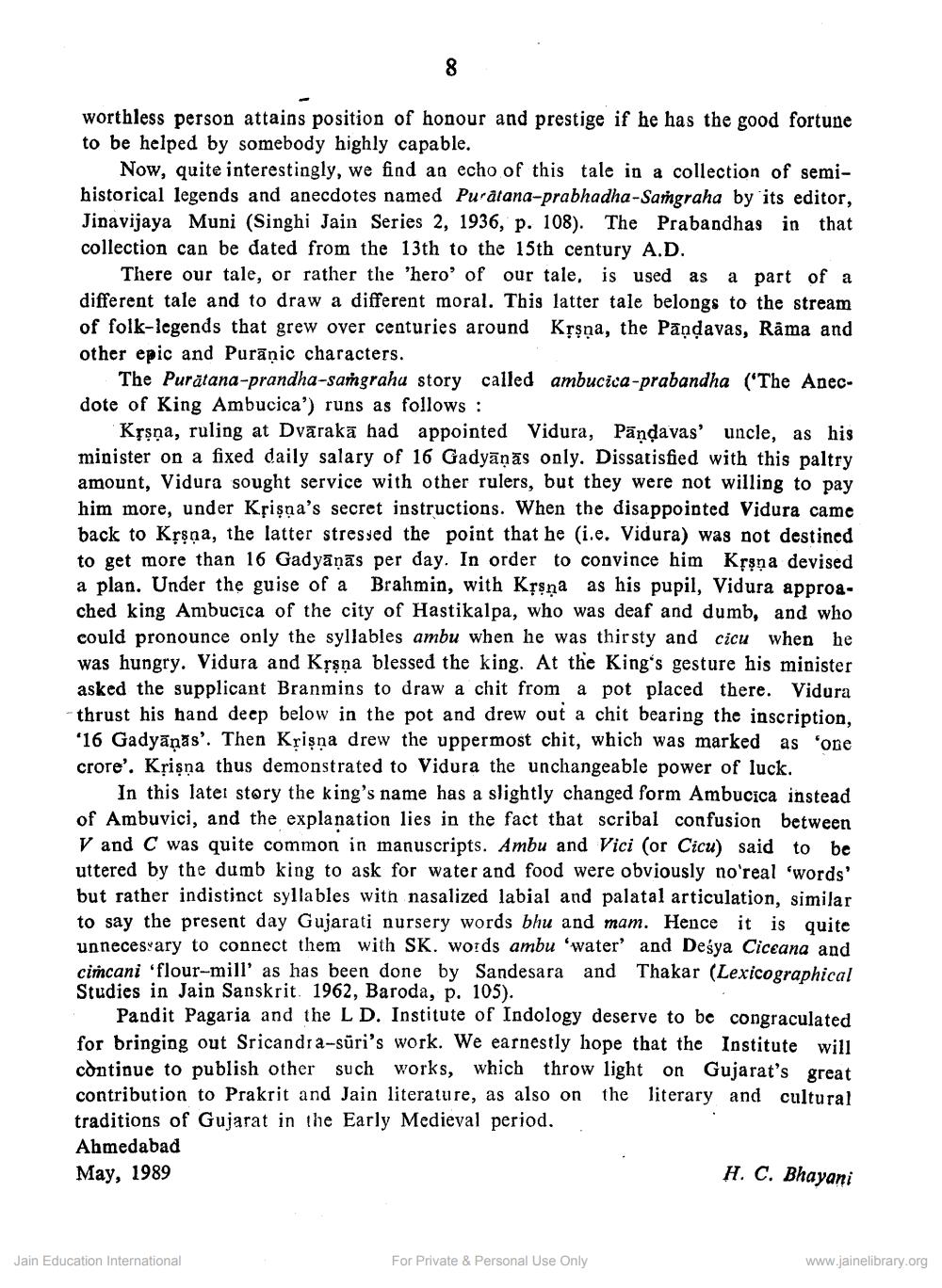Book Title: Munisuvratasvamicarita Author(s): Chandrasuri, Rupendrakumar Pagariya, Yajneshwar S Shastri, R S Betai Publisher: L D Indology Ahmedabad View full book textPage 9
________________ 8 worthless person attains position of honour and prestige if he has the good fortune to be helped by somebody highly capable. Now, quite interestingly, we find an echo of this tale in a collection of semihistorical legends and anecdotes named Puratana-prabhadha-Samhgraha by its editor, Jinavijaya Muni (Singhi Jain Series 2, 1936, p. 108). The Prabandhas in that collection can be dated from the 13th to the 15th century A.D. There our tale, or rather the 'hero' of our tale, is used as a part of a different tale and to draw a different moral. This latter tale belongs to the stream of folk-legends that grew over centuries around Krsna, the Pandavas, Rāma and other epic and Puranic characters. The Puratana-prandha-samgraha story called ambucica-prabandha ("The Anecdote of King Ambucica') runs as follows : Krsna, ruling at Dvaraka had appointed Vidura, Pandavas uncle, as his minister on a fixed daily salary of 16 Gadyaṇas only. Dissatisfied with this paltry amount, Vidura sought service with other rulers, but they were not willing to pay him more, under Krisna's secret instructions. When the disappointed Vidura came back to Krsna, the latter stressed the point that he (i.e. Vidura) was not destined. to get more than 16 Gadyaņas per day. In order to convince him Krsna devised a plan. Under the guise of a Brahmin, with Krsna as his pupil, Vidura approached king Ambucica of the city of Hastikalpa, who was deaf and dumb, and who could pronounce only the syllables ambu when he was thirsty and cicu when he was hungry. Vidura and Kṛṣṇa blessed the king. At the King's gesture his minister asked the supplicant Branmins to draw a chit from a pot placed there. Vidura thrust his hand deep below in the pot and drew out a chit bearing the inscription, '16 Gadyanas'. Then Krisna drew the uppermost chit, which was marked as 'one crore'. Krisna thus demonstrated to Vidura the unchangeable power of luck. In this latet story the king's name has a slightly changed form Ambucica instead of Ambuvici, and the explanation lies in the fact that scribal confusion between V and C was quite common in manuscripts. Ambu and Vici (or Cicu) said to be uttered by the dumb king to ask for water and food were obviously no'real 'words' but rather indistinct syllables with nasalized labial and palatal articulation, similar to say the present day Gujarati nursery words bhu and mam. Hence it is quite unnecessary to connect them with SK. words ambu 'water' and Deśya Ciceana and cimcani 'flour-mill' as has been done by Sandesara and Thakar (Lexicographical Studies in Jain Sanskrit 1962, Baroda, p. 105). Pandit Pagaria and the L D. Institute of Indology deserve to be congraculated for bringing out Sricandra-suri's work. We earnestly hope that the Institute will continue to publish other such works, which throw light on Gujarat's great contribution to Prakrit and Jain literature, as also on the literary and cultural traditions of Gujarat in the Early Medieval period. Ahmedabad May, 1989 Jain Education International For Private & Personal Use Only H. C. Bhayani www.jainelibrary.orgPage Navigation
1 ... 7 8 9 10 11 12 13 14 15 16 17 18 19 20 21 22 23 24 25 26 27 28 29 30 31 32 33 34 35 36 37 38 39 40 41 42 43 44 45 46 47 48 49 50 51 52 53 54 55 56 57 58 59 60 61 62 63 64 65 66 67 68 69 70 71 72 73 74 75 76 77 78 79 80 81 82 83 84 85 86 87 88 89 90 91 92 ... 376
